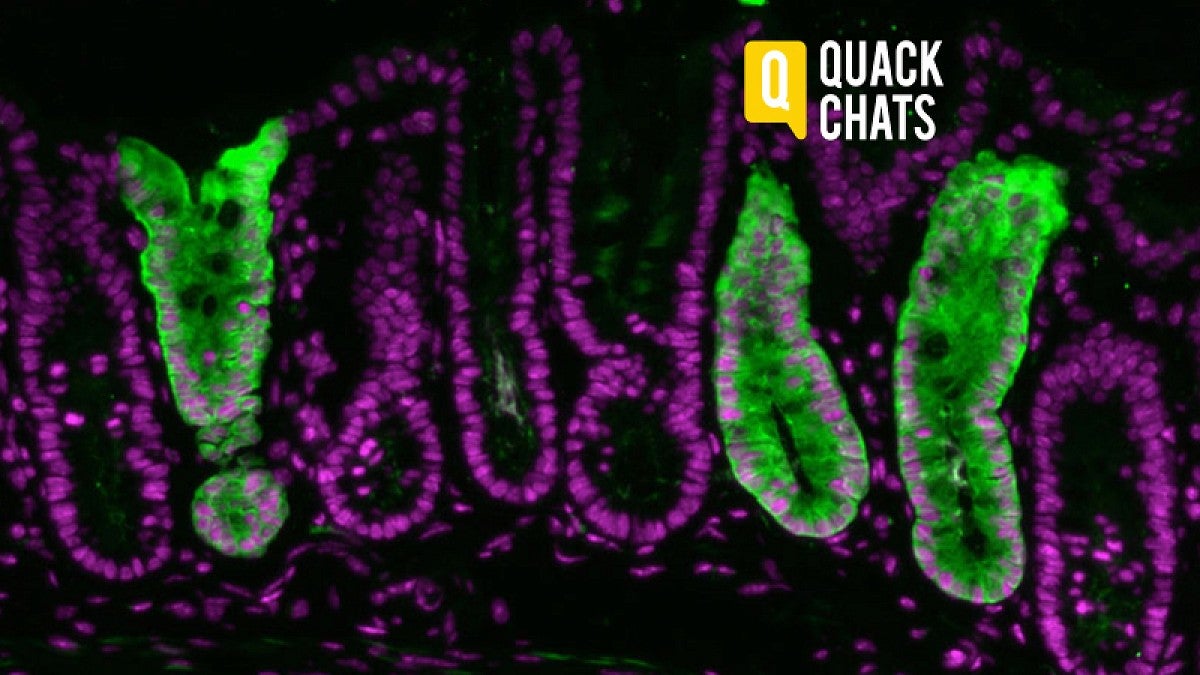Scientists know a lot about neurons in the brain, but University of Oregon cell biologist Annie Zemper says researchers know surprisingly less about neurons in the gut and how diet and other activities that affect the gut may influence brain activity.
“While gut neuron research has been going on for years and years, led by pioneers of the field like the UO’s Judith Eisen, we are really far behind brain research in terms of knowing a lot about important specifics,” Zemper said. “We know that neurons fire all of the time in our brain, but there’s just as many neurons, if not more neurons, firing in our gut at the same time. A lot of them may be talking to the brain.”
Zemper will explore the gut-brain axis and other areas related to her research that examines the regulation of stem cells in the gut in her March 20 Quack Chats pub talk “Your ‘gut feelings’: where do they actually come from? An exploration of gut science.”
Although the discussion will be backed by scientific data on cell biology, neuroscience and what Zemper calls the “cross talk” that occurs between cells of the gut, she says the takeaway will be exploring the simple question of how our gut health – and how we live – impacts the way we feel.
And she will also include some amazing facts about the gut.
“The gut is essentially continuous with our outside skin and just like skin cells, we replenish our gut cells once a week,” Zemper said. “If you live to be in your 90s you will slough off six tons of gut cells in your lifetime.”
For more than 12 years, Zemper has studied the epithelial cells of the gut. Her research has implications for the causes and treatments of gut inflammation, some of which may be connected to the gut’s neuronal system. Recently she began working on a collaborative project with a team of neuroscientists, headed by postdoctoral fellow Kate Walsh, to zoom in on the neurons in the gut of mice.
“It’s fascinating to get in there, see them fire, and be able to ask, ‘How are these neurons communicating?’ ‘What are these neurons communicating?’ and ‘What if we eat a huge fatty meal? Does it influence the neurons that talk to our brain?’” Zemper said.
“I have a hypothesis that the stem cells in the gut actually talk to the neurons,” she said.
More research is needed to reinforce that theory, but Zemper is optimistic that more discoveries lie ahead as the gut earns more attention from neuroscientists, But first, she said, people need to get over some of our collective squeamishness when it comes to talking about a vital organ that does much more than just help turn food into waste.
“The gut is about more than just eating food and passing from one end to the other,” Zemper said. “There’s actually a lot of important influential stops along the way.”
“It is a heavily studied organ, but it’s not one we want to talk about in public,” Zemper added with a smile, hopeful that a pub talk on the subject will help the cause.
Zemper’s talk will begin at 6 p.m. at the Ax Billy Grill & Sports Bar, on the third floor of the Downtown Athletic Club, 999 Willamette St. Admission is free. Food and drinks will be available for purchase
Quack Chats is a program of University Communications. For more information, see the Quack Chats section on Around the O. A general description of Quack Chats and a calendar of additional Quack Chats and associated public events also can be found on the UO’s Quack Chats website.
—By Lewis Taylor, University Communications
(About the image: In the epi-fluorescence microscope image shown above, colon stem cells of mice have been colored green. Since the stem cells make all the other cells of the gut, those cells become green as well, resulting in U-shaped pockets of green cells. This coloring helps the Zemper lab track the cells of the colon.)


